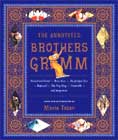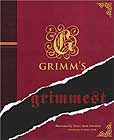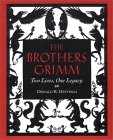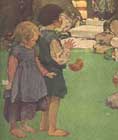
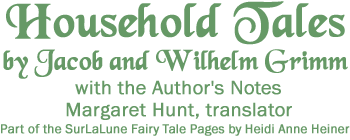
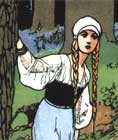
Author's Notes
translated by Margaret Hunt
Return
to
Household Tales:
Table of Contents
Previous
Tale:
The Two Brothers
SurLaLune Fairy Tales Main Page
The
Little Peasant
THERE was a certain village wherein
no one lived but really rich peasants, and just one poor one, whom they
called the little peasant. He had not even so much as a cow, and still
less money to buy one, and yet he and his wife did so wish to have one.
One day he said to her, "Hark you, I have a good thought, there is
our gossip the carpenter, he shall make us a wooden calf, and paint it
brown, so that it look like any other, and in time it will certainly get
big and be a cow." The woman also liked the idea, and their gossip
the carpenter cut and planed the calf, and painted it as it ought to be,
and made it with its head hanging down as if it were eating.
Next morning when the cows were being driven out, the little peasant called the cow-herd and said, "Look, I have a little calf there, but it is still small and has still to be carried." The cow-herd said, "All right, and took it in his arms and carried it to the pasture, and set it among the grass." The little calf always remained standing like one which was eating, and the cow-herd said, "It will soon run alone, just look how it eats already!" At night when he was going to drive the herd home again, he said to the calf, "If thou canst stand there and eat thy fill, thou canst also go on thy four legs; I don't care to drag thee home again in my arms." But the little peasant stood at his door, and waited for his little calf, and when the cow-herd drove the cows through the village, and the calf was missing, he inquired where it was. The cow-herd answered, "It is still standing out there eating. It would not stop and come with us." But the little peasant said, "Oh, but I must have my beast back again." Then they went back to the meadow together, but some one had stolen the calf, and it was gone. The cow-herd said, "It must have run away." The peasant, however, said, "Don't tell me that," and led the cow-herd before the mayor, who for his carelessness condemned him to give the peasant a cow for the calf which had run away.
And now the little peasant and his wife had the cow for which they had so long wished, and they were heartily glad, but they had no food for it, and could give it nothing to eat, so it soon had to be killed. They salted the flesh, and the peasant went into the town and wanted to sell the skin there, so that he might buy a new calf with the proceeds. On the way he passed by a mill, and there sat a raven with broken wings, and out of pity he took him and wrapped him in the skin. As, however, the weather grew so bad and there was a storm of rain and wind, he could go no farther, and turned back to the mill and begged for shelter. The miller's wife was alone in the house, and said to the peasant, "Lay thyself on the straw there", and gave him a slice of bread with cheese on it. The peasant ate it, and lay down with his skin beside him, and the woman thought, "He is tired and has gone to sleep." In the meantime came the parson; the miller's wife received him well, and said, "My husband is out, so we will have a feast." The peasant listened, and when he heard about feasting he was vexed that he had been forced to make shift with a slice of bread with cheese on it. Then the woman served up four different things, roast meat, salad, cakes, and wine.
Just as they were about to sit down and eat, there was a knocking outside. The woman said, "Oh, heavens! It is my husband!" She quickly hid the roast meat inside the tiled stove, the wine under the pillow, the salad on the bed, the cakes under it, and the parson in the cupboard in the entrance. Then she opened the door for her husband, and said, "Thank heaven, thou art back again! There is such a storm, it looks as if the world were coming to an end." The miller saw the peasant lying on the straw, and asked, "What is that fellow doing there?" "Ah," said the wife, "the poor knave came in the storm and rain, and begged for shelter, so I gave him a bit of bread and cheese, and showed him where the straw was." The man said, "I have no objection, but be quick and get me something to eat." The woman said, "But I have nothing but bread and cheese." "I am contented with anything," replied the husband, "so far as I am concerned, bread and cheese will do," and looked at the peasant and said, "Come and eat some more with me." The peasant did not require to be invited twice, but got up and ate. After this the miller saw the skin in which the raven was, lying on the ground, and asked, "What hast thou there?" The peasant answered, "I have a soothsayer inside it." "Can he foretell anything to me?" said the miller. "Why not?" answered the peasant, "but he only says four things, and the fifth he keeps to himself." The miller was curious, and said, "Let him foretell something for once." Then the peasant pinched the raven's head, so that he croaked and made a noise like krr, krr. The miller said, "What did he say?" The peasant answered, "In the first place, he says that there is some wine hidden under the pillow." "Bless me!" cried the miller, and went there and found the wine. "Now go on," said he. The peasant made the raven croak again, and said, "In the second place, he says that there is some roast meat in the tiled stove." "Upon my word!" cried the miller, and went thither, and found the roast meat. The peasant made the raven prophesy still more, and said, "Thirdly, he says that there is some salad on the bed." "That would be a fine thing!" cried the miller, and went there and found the salad. At last the peasant pinched the raven once more till he croaked, and said, "Fourthly, he says that there are some cakes under the bed." "That would be a fine thing!" cried the miller, and looked there, and found the cakes.
And now the two sat down to the table together, but the miller's wife was frightened to death, and went to bed and took all the keys with her. The miller would have liked much to know the fifth, but the little peasant said, "First, we will quickly eat the four things, for the fifth is something bad." So they ate, and after that they bargained how much the miller was to give for the fifth prophesy, until they agreed on three hundred thalers. Then the peasant once more pinched the raven's head till he croaked loudly. The miller asked, "What did he say?" The peasant replied, "He says that the Devil is hiding outside there in the cupboard in the entrance." The miller said, "The Devil must go out," and opened the house-door; then the woman was forced to give up the keys, and the peasant unlocked the cupboard. The parson ran out as fast as he could, and the miller said, "It was true; I saw the black rascal with my own eyes." The peasant, however, made off next morning by daybreak with the three hundred thalers.
At home the small peasant gradually launched out; he built a beautiful house, and the peasants said, "The small peasant has certainly been to the place where golden snow falls, and people carry the gold home in shovels." Then the small peasant was brought before the Mayor, and bidden to say from whence his wealth came. He answered, "I sold my cow's skin in the town, for three hundred thalers." When the peasants heard that, they too wished to enjoy this great profit, and ran home, killed all their cows, and stripped off their skins in order to sell them in the town to the greatest advantage. The Mayor, however, said, "But my servant must go first." When she came to the merchant in the town, he did not give her more than two thalers for a skin, and when the others came, he did not give them so much, and said, "What can I do with all these skins?"
Then the peasants were vexed that the small peasant should have thus overreached them, wanted to take vengeance on him, and accused him of this treachery before the Mayor. The innocent little peasant was unanimously sentenced to death, and was to be rolled into the water, in a barrel pierced full of holes. He was led forth, and a priest was brought who was to say a mass for his soul. The others were all obliged to retire to a distance, and when the peasant looked at the priest, he recognized the man who had been with the miller's wife. He said to him, "I set you free from the cupboard, set me free from the barrel." At this same moment up came, with a flock of sheep, the very shepherd who as the peasant knew had long been wishing to be Mayor, so he cried with all his might, "No, I will not do it; if the whole world insists on it, I will not do it!" The shepherd hearing that, came up to him, and asked, "What art thou about? What is it that thou wilt not do?" The peasant said, "They want to make me Mayor, if I will but put myself in the barrel, but I will not do it." The shepherd said, "If nothing more than that is needful in order to be Mayor, I would get into the barrel at once." The peasant said, "If thou wilt get in, thou wilt be Mayor." The shepherd was willing, and got in, and the peasant shut the top down on him; then he took the shepherd's flock for himself, and drove it away. The parson went to the crowd, and declared that the mass had been said. Then they came and rolled the barrel towards the water. When the barrel began to roll, the shepherd cried, "I am quite willing to be Mayor." They believed no otherwise than that it was the peasant who was saying this, and answered, "That is what we intend, but first thou shalt look about thee a little down below there," and they rolled the barrel down into the water.
After that the peasants went home, and as they were entering
the village, the small peasant also came quietly in, driving a flock of
sheep and looking quite contented. Then the peasants were astonished,
and said, "Peasant, from whence comest thou? Hast thou come out of
the water?" "Yes, truly," replied the peasant, "I
sank deep, deep down, until at last I got to the bottom; I pushed the
bottom out of the barrel, and crept out, and there were pretty meadows
on which a number of lambs were feeding, and from thence I brought this
flock away with me." Said the peasants, "Are there any more
there?" "Oh, yes," said he, "more than I could do
anything with." Then the peasants made up their minds that they too
would fetch some sheep for themselves, a flock apiece, but the Mayor said,
"I come first." So they went to the water together, and just
then there were some of the small fleecy clouds in the blue sky, which
are called little lambs, and they were reflected in the water, whereupon
the peasants cried, "We already see the sheep down below!" The
Mayor pressed forward and said, "I will go down first, and look about
me, and if things promise well I'll call you." So he jumped in; splash!
went the water; he made a sound as if he were calling them, and the whole
crowd plunged in after him as one man. Then the entire village was dead,
and the small peasant, as sole heir, became a rich man.
Grimm, Jacob and Wilhelm. Household Tales. Margaret Hunt, translator. London: George Bell, 1884, 1892. 2 volumes.
Notes
From Zwehrn. Another story, from Hesse, tells of a tailor who makes his fortune in this manner, but it is less complete. It likewise begins with the tailor finding a benumbed thrush which he afterwards puts to his ear that it may prophesy to him. When he is shut up in the chest on the water, he cries out that on no account will he marry the princess, and thus entices the shepherd to take his place. According to another story, the man is called Herr Hands. The peasants hate him because of his cunning, and in their envy destroy his baking-oven; he, however, carries away some of the remains of it in a sack to a noble lady, and begs her to take care of the sack for him, and. says that there are spices, cinnamon, cloves and pepper in it. Then he goes to fetch it away again and makes a great outcry, and says she has robbed him, whereby he extorts three hundred thalers from her. The peasants see the money being counted out to him, and ask how he has come by it? He says it is for the remains of the oven. Then all the peasants destroy their ovens and carry what is left of them to the town, but fare badly. They want to revenge themselves by killing him; he puts on his mother's clothes, and thus escapes, but his mother is killed. He rolls her in a cask to a doctor, leaves her standing there a while, and then returns and blames him for killing her, and thus obtains a sum of money from the doctor. He tells the peasants that he has got this for his dead mother, on which they all kill their mothers too. Then comes the incident of the shepherd getting into the barrel and being drowned in his place, and of the other peasants all leaping in after him. In the story of Peasant Kibitz, which Büsching gives (p. 296), there are also some varying features. Kibitz lets his wife be killed by the peasants, and then sets her up by some railings with a basketful of fruit, and a servant, who has been ordered by his master and mistress to buy something from her, pushes her into the water because she returns no answer. For this Kibitz receives the carriage in which the master was driving, together with all that pertains to it. Obtaining money by mere clamour is also part of the cunning of Gonella (Flögel's Gesch. der Hofnarren, p. 309). In the people's book, "Rutschki or the Bürgher of Quarkenquatsch," various incidents from this story are used, the purchasing the old chest in which the lover is hid for the cow-hide (p. 10), and the setting up the dead wife. Rutschki puts some butter on her lap, and sets her by the side of the well, and the apothecary who wants to buy some, but can obtain no answer from her, shakes her and pushes her down into it, and for that he has to pay Rutschki a thousand thalers (pp. 18, 19). The betrayal of the shepherd at the end is also quite different. Rutschki is condemned to death, and is bolted into a clothes-press, and taken out to the pond; but, as this is frozen over, they leave the press standing, and go away to fetch axes to cut a hole in the ice. While they are absent, Rutschki hears a cattle-dealer going by, and calls out, "I will not drink any wine! I will not drink any wine! I am not thirsty!" The cattle-dealer asks what he is doing. Rutschki gets him to unbolt the door, and tells him that he has been elected burgomaster, and is quite willing to accept the appointment, for very little work and a salary of five hundred thalers go with it, but that he will on no account comply with the custom that every burgomaster shall, when he takes office, drink to the dregs a great glass of Burgundy, because he never drinks any wine at all. He also says that they have set him out there on the ice in order that the frost may make him long for a warm draught, but that all is in vain, for he will not drink it. The cattle-dealer proposes to exchange his herd for this position, and gets into the press. Rutschki bolts it. The peasants come and cut a hole, and let the press down into it. When they are returning, they meet Rutschki with the cattle, and he tells them that he has found them at the bottom of the pond, and, that it is a beautiful land where perpetual summer reigns. And now they all plunge into the water (pp. 22, 23). H. Stahl communicates another version in the Mitternachtblatt, 1829, No. 35, 36. The poor peasant is called Hick, and lives at Lieberhausen in the county of Gimbornueustadt. His poverty compels him to slaughter his only cow, and he goes to Cologne to sell its hide. As he is going, it begins to rain, so he covers himself with the hide, the bloody side being outwards. A raven lights upon it, and is about to eat. Hick catches it carefully, and takes it with him into the town. He relates his adventure in an inn at Cologne. He twitches the raven's tail and makes him prophesy. The innkeeper buys the prophet at a high price. Hick tells his neighbours that cows' hides are frightfully dear in Cologne. The people of Lieberhausen now kill all their cows, and get nothing by the sale of the hides. Out of revenge they put Hick in a barrel to roll him into the Rhine, but they stop awhile at an inn on the shore. Hick cries from the barrel, "I am to go to Cologne to be bishop," and a shepherd gives him his sheep, and takes his place in the barrel. Hick drives his flock home, and tells the people of Lieberhausen that he has found them in the Rhine, and that the bottom of the river is full of them. Hick advises one of them to jump into the river, and when he has found the sheep, to come to the top again and stretch out both arms as a token. They follow his advice, and when one of them has leaped in, and before drowning stretches out his arms, they all leap, plump, plump, after him. Two stories from the Tyrol in Zingerle have many peculiarities, pp. 5 and 419. There is another in Pröhle's Märchen für die Jugend, No. 15; and two which vary very much in Müllenhoff, Nos. 23 and 24, which repeat the contents of the Latin Unibos of the 11th century in the most perfect manner. (Jac. Grimm, Latein. Gedichte, p. 354, and notes 382.) The Wallachian story Balkálá, No. 22 in Schott, is allied with this.
Solitary jests are narrated separately. Bartoldo prevails on a watchman to open the sack in which he is lying imprisoned, and to creep in himself by pretending to him that he has only concealed himself because he did not wish to marry a beautiful girl. See Hagen's preface to Morolf, p. 19. There is something of the same kind in the Irish story of Darby Duly (K. v., K.,[1] 2, 23). The jest of the peasant, the miller, the miller's wife and the parson, is even to be found in the old German poem Der Kündige Kneht (Viennese MS. 428, No. 62). The servant tells a story about a wolf, and skilfully alludes to the concealed sheep. See also Eyering (2. 430), and, Burkard Waldis. The story of Old Hildebrand, No. 95, No. 63, in Pröhle's Kindermärchen, is allied. In Danish there is Little Klaus and Big Klaus, in Andersen, in Etlar, p. 134. From Vorarlberg, see. Vonbun, p. 36. In the Pentamerone, see The Godfather (2, 10), in Straparola, Scarpafico (1. 3). As for the rest, the peasants-peasants have been in every period of time easily betrayed-are clearly allied to the Lalenbürgers.
©Heidi
Anne Heiner, SurLaLune Fairy Tales
E-mail: surlalune@aol.com
Page last updated October 15, 2006
www.surlalunefairytales.com




